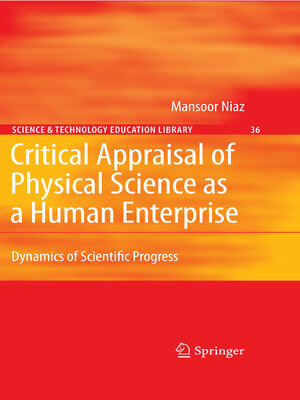Critical Appraisal of Physical Science as a Human Enterprise
ebook ∣ Dynamics of Scientific Progress · Contemporary Trends and Issues in Science Education
By Mansoor Niaz

Sign up to save your library
With an OverDrive account, you can save your favorite libraries for at-a-glance information about availability. Find out more about OverDrive accounts.
Find this title in Libby, the library reading app by OverDrive.



Search for a digital library with this title
Title found at these libraries:
| Loading... |
It is generally believed that doing science means accumulating empirical data with no or little reference to the interpretation of the data based on the scientist's th- retical framework or presuppositions. Holton (1969a) has deplored the widely accepted myth (experimenticism) according to which progress in science is presented as the inexorable result of the pursuit of logically sound conclusions from un- biguous experimental data. Surprisingly, some of the leading scientists themselves (Millikan is a good example) have contributed to perpetuate the myth with respect to modern science being essentially empirical, that is carefully tested experim- tal facts (free of a priori conceptions), leading to inductive generalizations. Based on the existing knowledge in a field of research a scientist formulates the guiding assumptions (Laudan et al. , 1988), presuppositions (Holton, 1978, 1998) and "hard core" (Lakatos, 1970) of the research program that constitutes the imperative of presuppositions, which is not abandoned in the face of anomalous data. Laudan and his group consider the following paraphrase of Kant by Lakatos as an important guideline: philosophy of science without history of science is empty. Starting in the 1960s, this "historical school" has attempted to redraw and replace the positivist or logical empiricist image of science that dominated for the first half of the twentieth century. Among other aspects, one that looms large in these studies is that of "guiding assumptions" and has considerable implications for the main thesis of this monograph (Chapter 2).






